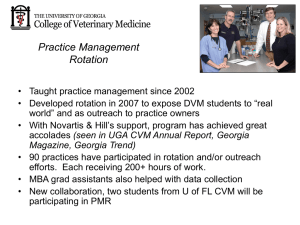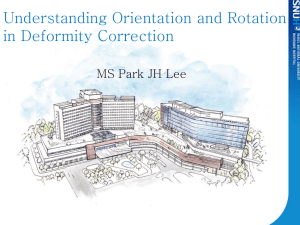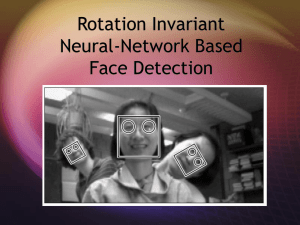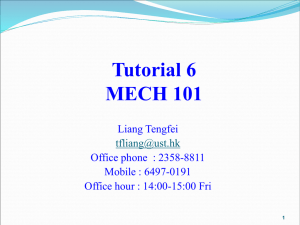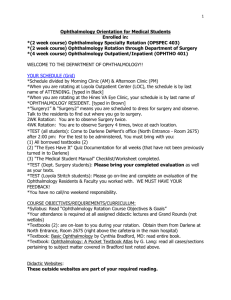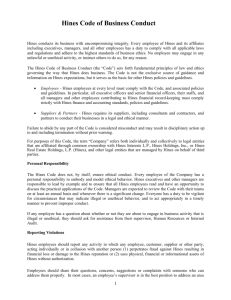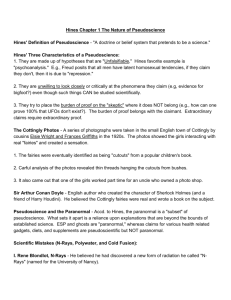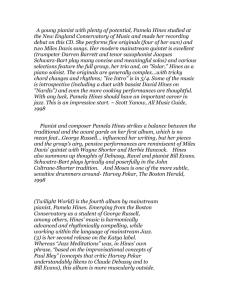Syllabus - Stritch School of Medicine
advertisement
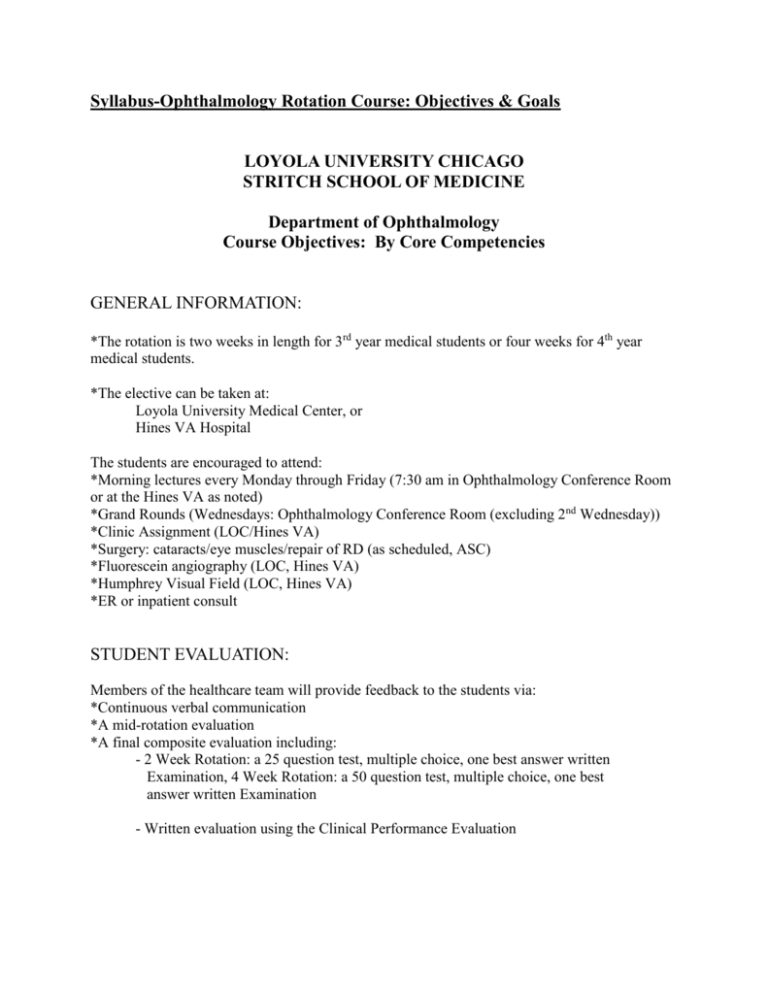
Syllabus-Ophthalmology Rotation Course: Objectives & Goals LOYOLA UNIVERSITY CHICAGO STRITCH SCHOOL OF MEDICINE Department of Ophthalmology Course Objectives: By Core Competencies GENERAL INFORMATION: *The rotation is two weeks in length for 3rd year medical students or four weeks for 4th year medical students. *The elective can be taken at: Loyola University Medical Center, or Hines VA Hospital The students are encouraged to attend: *Morning lectures every Monday through Friday (7:30 am in Ophthalmology Conference Room or at the Hines VA as noted) *Grand Rounds (Wednesdays: Ophthalmology Conference Room (excluding 2nd Wednesday)) *Clinic Assignment (LOC/Hines VA) *Surgery: cataracts/eye muscles/repair of RD (as scheduled, ASC) *Fluorescein angiography (LOC, Hines VA) *Humphrey Visual Field (LOC, Hines VA) *ER or inpatient consult STUDENT EVALUATION: Members of the healthcare team will provide feedback to the students via: *Continuous verbal communication *A mid-rotation evaluation *A final composite evaluation including: - 2 Week Rotation: a 25 question test, multiple choice, one best answer written Examination, 4 Week Rotation: a 50 question test, multiple choice, one best answer written Examination - Written evaluation using the Clinical Performance Evaluation Ophthalmology Course Objectives by Core Competencies Page Two COMPETENCY BASED GOALS & OBJECTIVES: Goal 1: Medical Knowledge At the end of the rotation the student will be able to: *Describe the anatomy of the eye and eyelids *Describe a normal eye exam: - Anterior Segment - Posterior Segment *Discuss Refractive Errors: - Hyperopia/Myopia/Astigmatism/Presbyopia *Discuss the differential diagnosis of the “Red Eye”: “D4 Vitamins” ▫ Diet/Development/Drug/Degenerative? ▫ Vascular? ▫ Immune? ▫ Toxic/Traumatic? ▫ Autoimmune/Anoxic? ▫ Metabolic? ▫ Endocrine? ▫ Neoplastic? ▫ Special? * Discuss types of glaucoma – risk factors and management (medications/laser/surgery) * Discuss types of cataracts * Discuss types of retina detachment (RD) and age-related macular degeneration (ARMD) * Discuss ocular changes in diabetes mellitus (DM) * Discuss ocular changes in hypertension (HTN) * Discuss optic neuropathy Goal 2: Communication Skills At the end of the rotation, the student will demonstrate the ability to: *Elicit, record, and present focused histories and eye findings of assigned patients to the health care team *Collaborate with members of the health care team in the care and treatment of the patient *Explain to patients and/or patient’s family eye findings from the patient exam *Participate during conferences with patients and their families *Discuss an approach to diagnosis and treatment Ophthalmology Course Objectives by Core Competencies Page Three Goal 3: Professionalism During the rotation the student will demonstrate the ability to: *Care conscientiously for assigned patients with appropriate standards of professional, ethical, and moral conduct *Display the following appropriate behaviors: - Dress, grooming, punctuality, honesty, respect for confidentiality and privacy, and motivation - Conversed and behaved appropriately in interactions with peers, faculty, house staff, and non-physician staff - Recognize and accept own limitations in knowledge and skills, and display commitment to continuous improvement in these abilities Goal 4: Patient Care At the end of the rotation, the student will be able to: *Assist in providing overall care for assigned patients, including record keeping, interacting with families, and collaborating with other health care personnel *Construct H&Ps that are legible, concise, and complete *Work collaboratively with healthcare team members Goal 5: Practice Based and Lifelong Learning At the end of the rotation, the student will demonstrate the ability to: *Identify and effectively use educational resources, including on-line searches *Use information technology to access and manage clinical information and to acquire knowledge of specific topics related to his/her patient *Search, evaluate and present a critical review on a topic (at the end of a 4 week rotation with interest in our residency program we expect a PowerPoint presentation in one of our Grand Rounds) *Recognize areas of knowledge and practice in which they are uncertain and develop learning goals and plans for self-improvement Goal 6: Social and Community Context of Healthcare At the end of the rotation the student will be able to: *Discuss the immense impact impaired vision or even blindness has on patient’s life including that of their families. *Recognize the importance of prevention of blindness *Discuss the importance of compliance with medications, diet, smoking and exercise STUDENT ROTATION WELCOME PACKET July 2009+/Syllabus-Course Objectives by Core Competencies GOALS/OBJECTIVES Ophthalmology Rotation: 2 or 4 Week SKILLS: * Obtain an accurate eye history * Become familiar with complete eye exam ▫ Visual Acuity-distance/near/pinhole (PH) significance ▫ Pupils-be able to diagnose afferent papillary defect (APD) ▫ Motility ▫ Confrontational Visual Field ▫ Slit Lamp Exam (SLE) ▫ Fundus Exam-direct and indirect ophthalmoscopy * Proper technique for installation of eye drops * Proper technique for eversion of the eyelid – removal of superficial foreign bodies (FB) * Application of fluorescein and use of cobalt blue light * Become familiar with intraocular pressure (IOP) checks – Goldmann applanation vs TonoPen *Evaluation of the optic nerve (ON) KNOWLEDGE: * Anatomy of the eye and eyelids * Describe a normal eye exam - Anterior Segment - Posterior Segment * Hyperopia/Myopia/Astigmatism/Presbyopia *Differential Diagnosis of the “Red Eye” - “D4 Vitamins” ▫ Diet/Development/Drug/Degenerative? ▫ Vascular? ▫ Immune? ▫ Toxic/Traumatic? ▫ Autoimmune/Anoxic? ▫ Metabolic? ▫ Endocrine? ▫ Neoplastic? ▫ Special? * Types of glaucoma – risk factors and management (medications/laser/surgery) * Types of cataracts * Types of retina detachment (RD) and age-related macular degeneration (ARMD) * Ocular changes in diabetes mellitus (DM) *Ocular changes in hypertension (HTN) *Optic neuropathy STUDENTS SHOULD ATTEND: *Morning lectures every Monday through Friday (7:30 am in Ophthalmology Conference Room or at Hines VA as noted) *Grand Rounds (Wednesdays: Ophthalmology Conference Room (excluding 2nd Wednesday)) *Clinic Assignment (LOC/Hines VA) *Surgery: cataracts/eye muscles/repair of RD (as scheduled, ASC) *Fluorescein angiography (LOC, Hines VA) *Humphrey Visual Field (LOC, Hines VA) *ER or in-patient consult STUDENT ROTATION PROGRAM/Syllabus-Goals for 2 & 4 Week Rotation (Non-Competencies)
